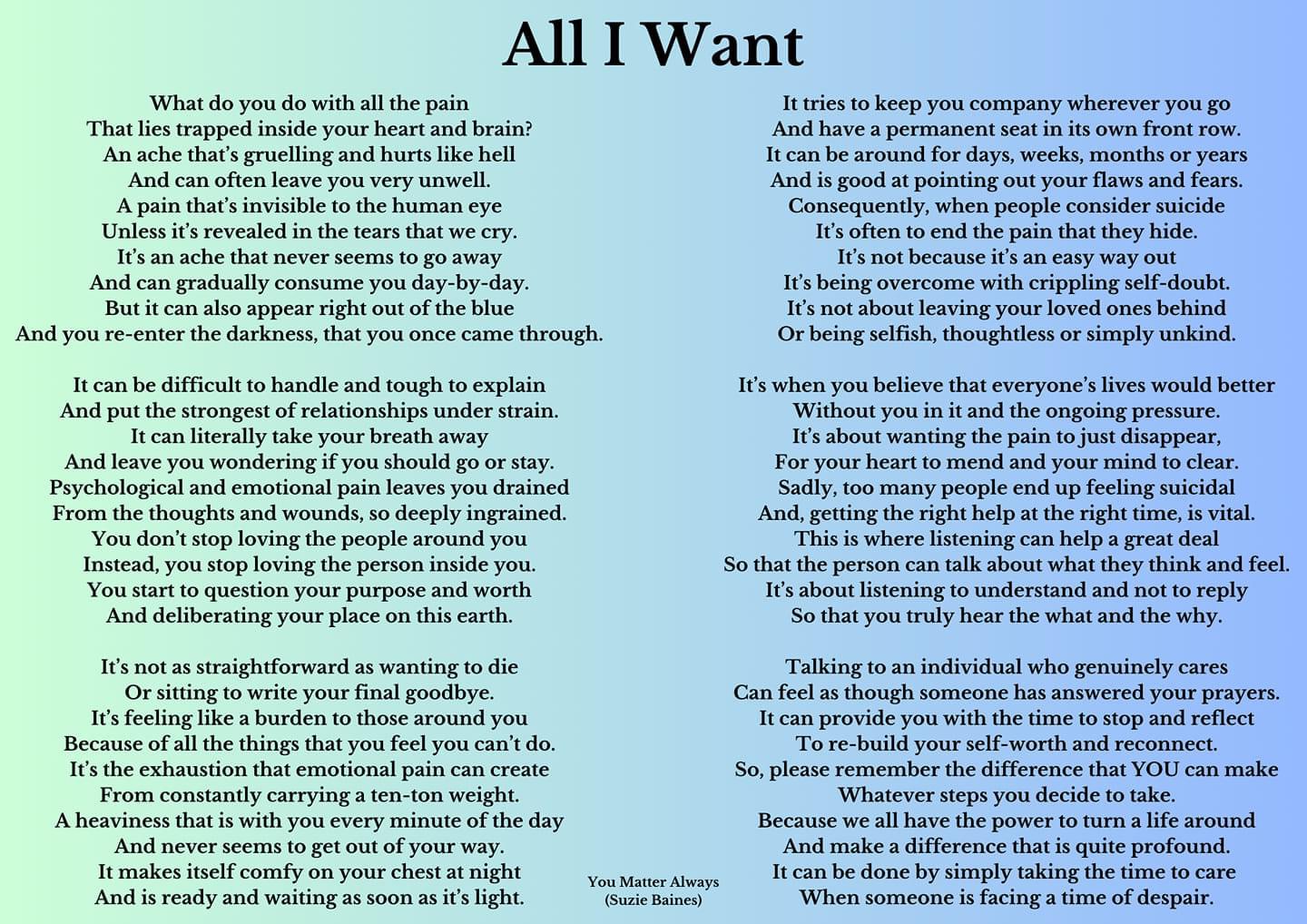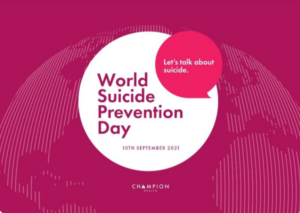Dealing with suicidal thoughts
Whether you’re concerned about your own mental well-being or that of someone else, knowing how to help, what to say and who to contact can be the difference between life and death. This resource section will continually be updated to provide you with the most up to date and relevant information and support, based on your specific needs:
I am having suicidal thoughts or someone I know is
Before we signpost you to practical support, we thought you might like to read this wonderful poem by Suzanne Baines from You Matter Always. We hope these words resonate with you if you are feeling suicidal:

If you are considering taking your own life, right now, you probably feel that there is no other option – it could be that you’ve been feeling this way for some time and you possibly have a plan already in place?
If you’re struggling and you’re not sure if you want to live or die, can you, just for now, hold off making this decision and click the following link to StayingSafe.net . Once you’re there, keep reading and watching the videos for some ideas about how to get through. There may be things that you – and other people – can do to make things better.
You may have found yourself wishing that you were dead, or perhaps thinking that the people who you care about would be better off without you but with support you can choose to live.
Even situations that seem almost impossible to face can feel different if you remind yourself that feelings don’t last forever and you have an idea of what you can do to get through this painful time.
How to create a Safety Plan
Information about how to make a Safety Plan can be found here on the StayingSafe.net website for anyone struggling with suicidal thoughts or supporting someone else. It’s designed to offer hope, compassion and practical ideas on how to find your own way forward.
Please keep reading and keep watching the films where you’ll find everything you need to know about making a Safety Plan and how it will help you. You will find details of what you can do for yourself and who you can contact for support when you need it.
‘How do I support someone who is considering suicide?’
You may be concerned about someone you know and just as worried about saying or doing the wrong thing. Either way, it is vital that you ask the question; “Are you considering taking your own life?”. Next, you need to ensure they are safe until appropriate professional help is available.
In the first instance, we would recommend you suggest the person follows the StayingSafe.net guidelines shown above, whilst you remain with them or contact any of the resources shown below, with Options 1-3 being the most important in an emergency.
UK help:
1. What else can you do to help keep you safe? We understand that the healthcare system often appears overstretched and under-resourced and you may feel that you’re not receiving the help you feel you desperately need. York Ending Stigma (YES) has created a really useful leaflet to help enable you find a way to talk about your feelings of wanting to end your own life. If you are feeling suicidal, please would you read this leaflet by clicking this link. This information has been created by individuals who have also been where you are and they have an understanding. Visit the YES website here.
2. Visit your local hospital’s A&E department or ask for an Emergency Doctor’s appointment without delay. Click here for NHS Psychological therapies (IAPT) services
3. Doc Ready – if you need to speak to a doctor about your mental health, knowing what to say, when you’re under stress, can be difficult and you may omit important information. Doc Ready provides a template for you to write out what you need to ask the Doctor before you speak with them – Visit site
4. Visit the NHS’s urgent help information website page here.
5. Call The Samaritans – call for free to 116 123 (UK and Ireland). Occasionally their line might be busy. If this is the case don’t give up, either try again later or use one of the other support services shown on this page. Take a look at their comprehensive guide for anyone who is struggling to cope here. Visit Samaritans main website here
6. Shout is a free text service 85258, where you are immediately put through to a trained individual who can help if you are in crisis – Visit site
7. Grassroots, STAYALIVE app is a pocket suicide prevention resource for the UK, packed full of useful information to help you stay safe. You can use it if you are having thoughts of suicide or if you are concerned about someone else who may be considering suicide. Visit site.
Concerned about someone you know?
If you are concerned that someone you know might be suicidal then how do you have that conversation with them? Grassroots has created this very powerful ‘Real Talk’ interactive film, showing ‘Chris’ being supported by his new flatmate. Warning: in our view, the acting in this film is extremely realistic and powerful and you may find it hard to watch, particularly if you have been personally affected by suicide.
8. Hub of Hope – if you are struggling with your mental health, Hub of Hope provides help locally to you. Just add your postcode and you’ll have immediate access to a GP, psychotherapist etc – Visit site
9. Calm- Campaign Against Living Miserably provoke conversation, run life-saving services, and bring people together so they reject living miserably, get help when they need it and don’t die by suicide. Visit website.
10. Andy’s Man Club’s men’s mental health support groups operate throughout the UK, providing opportunities for men who have either been through a storm, are currently going through a storm or have a storm brewing in life to talk with others experiencing similar situations. You can find a club local to you here
11. Clic is a safe, online forum where you can connect and discuss your thoughts with others who are also struggling. It includes support resources for you, your carer, family and friends to help keep you safe. Visit site
12. R;pple – launched by Alice Hendy, following the suicide of her brother Josh, this internet browser extension is a must have tool. By downloading the extension, if any member of your family, friends, colleagues enters potentially harmful search words into their browser, they are immediately presented with calming messages and a number of vital support resources Visit the site here
13. LGBT Foundation – Established in 1975, LGBT Foundation exists to support the needs of the diverse range of people who identify as lesbian, gay, bisexual and trans. You can visit the site here
14. Just ‘B’ (North Yorkshire) offers expert emotional wellbeing and bereavement support to children, young people and adults across the communities of North Yorkshire, as well as specialist support regionally and nationally. You can visit the site here.
15. Other international suicide helplines can be found here.
How to have a conversation with someone you are worried about
If you’re concerned that someone might be considering ending their life, it’s important you remain calm, approach them and ask them this question – “are you considering self-harming or having thoughts of suicide?”
Ignore the myth, you may have heard, which suggests that by asking these questions the person is more likely to act on their thoughts or you may plant the thought in their head, this is simply not the case.
The Zero Suicide Alliance provide an excellent free, online training courses here, that you can access in your own time. Option 1, the ZSA’s initial Gateway Training sessions, takes just 5-10 minutes to complete and you will learn how to approach someone that you think my be considering ending their own life.

Champion Health UK Ltd – World Suicide Prevention Day 2021, suicide prevention guide
This guide will enable you to better understand why someone might consider suicide and help you protect yourself or others, if you or someone you know is considering taking their own lives. Please download a copy of this important guide – click here: Champion Health Suicide Prevention Guide


I am anxious and often feel depressed

We would always recommend seeing your GP as soon as possible. Your doctor may determine that some form of anti-depressant medication is required to help reduce any extreme thoughts or behaviours you are experiencing. Medication often works best when supported by talking therapy.
At this point, we would recommend booking an appointment with your doctor as soon as possible. You might also consider contacting one of the many support organisations, who are equipped and ready to help you, these include:
1. CALM – Campaign Against Living Miserably – (England) run a free, confidential and anonymous helpline offering help, advice and information to anyone who is struggling or in crisis Visit website
2. MIND Visit website provides advice and support to empower anyone experiencing a mental health problem, including depression and anxiety.
3. PAPYRUS Prevention of Young Suicide is the UK charity dedicated to the prevention of suicide and the promotion of positive mental health and emotional wellbeing in young people. Their suicide prevention helpline, HOPELINEUK, is staffed by trained suicide prevention advisers, who work with young people – and anybody concerned for a young person – to help keep them safe from suicide. HOPELINEUK is a free and confidential call, text and email service, which is available from 9am to midnight, every day of the year. Full details including all helpline contact numbers can be found on the PAPYRUS website here.
4. Side by Side – provided by the charity MIND, Side by Side is a supportive online community where you can feel at home talking about your mental health and connect with others who understand what you are going through. Visit website
5. BAATN – this organisation is promoted as the home of the largest community of Counsellors and Psychotherapist of Black, African, Asian and Caribbean heritage in the UK. Visit website
6. Every Mind Matters is a Better Health resource site provided by the NHS in England, with links to other UK countries – click here to visit the website – here you will find a range of help guides, for all age groups, on topics relating to looking after your own mental health and how to support others.
7. BBC Headroom – your mental health toolkit – launched in 2021, the BBC launched Headroom with footballer Alex Scott as one of the key faces of this project. Headroom provides a toolkit of mindful tips, mood mixes, personal stories and other tools to help motivate you and support you, when your mental wellbeing is suffering. Visit website

The Wellbeing Support Grid

Complete this grid by adding who is in your support network
When you’re feeling highly anxious or possibly considering ending your life, knowing where or who to turn to, if/when you need help, could be the difference between a future life filled with infinite possibilities or the worst of possible outcomes, which is never knowing what could have been.
We would highly recommend that everyone downloads this Wellbeing Support Grid here: Wellbeing Support Grid
Print a copy of the grid and in the left column, write all the possible sources of support in your network – this could include family, friends, colleagues or professional and support groups on or off-line, list them all.
Then in the column headed Who Supports? write the name of who that specific person is who would be there for you.
In the next column, headed What Supports? write down what support that person or organisation could provide.
In the third column, headed ‘How Supports?’ write down how they deliver that support i.e. by telephone, online, face-to-face, do they come to you or do you go to them?
The best time to complete this grid is when you don’t need to, so why not download your copy now: Wellbeing Support Grid
The wellbeing grid has been created by Paul Vittles of Towards Zero Suicide.
 I have lost someone to suicide
I have lost someone to suicide
The ripple effect of someone dying by suicide can be immense. The following organisations are there to support anyone who is bereaved as a result of suicide, whatever your relationship to the person who took their own life.
- Calm- Campaign Against Living Miserably – (England) Visit website
- Mind – Provides information on bereavement, where to go for support, and suggestions for helping yourself and others through grief Visit website
- The Compassionate Friends (not suicide specific) – supporting bereaved parent and their families Visit global website / Visit UK website
Leeds Mind co-produced suicide prevention project
Leeds Mind worked with a team of volunteers across West Yorkshire who all have lived experience of being impacted by suicide either being in that position themself, supporting someone else or being bereaved. Drawing on lived experience, volunteers worked on projects and campaigns that aim to;
- Reduce stigma around mental health and suicide
- Raise awareness
- Champion the voices of people with lived experience
- Challenge and influence decision makers to improve mental health support for clients and families
Click this link to access a range of useful resources including:
- Lived Experience Films – a film was created which shows conversations speaking directly to health and care staff about experiences of secondary mental health services.
- Surviving Crisis: Learning From Lived Experience Podcast – Volunteers have used their own experiences to create a podcast series with the aim of supporting staff who work with people in crisis.
- Bereavement Support Leaflet – was created to offer simplified and concise support to those bereaved by suicide
- Lived Experience Involvement Guidelines – This resource is aimed at all staff working within health and care who involve people with lived experience in their work.
- Book of Cope – celebrates and shares the different strategies people from West Yorkshire use to boost their mental wellbeing, to help others when facing their own challenges.
- Community Conversations – captures people’s views on what has worked well, what didn’t work and if anything was missing from mental health services and support
Although this project was created in and refers to West Yorkshire, the principles are transferrable to any region in the UK.

